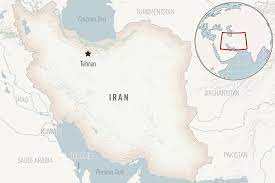
A prominent Iranian human rights lawyer who was detained last month for allegedly violating the country’s mandatory headscarf law was freed on bail, her husband said Wednesday.
Reza Khandan, the husband of Nasrin Sotoudeh, posted on the platform X, formerly known as Twitter, a photo of his wife and said: “Nasrin was freed on bail … hours ago.”
Sotoudeh was detained in October after she attended the funeral of a teenage girl, Armita Geravand, who died after being injured in a mysterious incident on Tehran’s Metro. At the time, authorities said Sotoudeh was arrested on a charge of violating Iran’s mandatory headscarf, or hijab, law.
Many Iranian news outlets republished the semiofficial Fars news agency report and said there were multiple arrests at Geravand’s funeral. She also was not wearing a headscarf at the time she was injured.
The 60-year-old Sotoudeh — known for defending activists, opposition politicians and women in Iran prosecuted for removing their headscarves — called the death of Geravand “another state murder.”
It’s not clear what happened in the few seconds after Geravand entered the train on Oct. 1. A friend told Iranian state television that Geravand hit her head on the station’s platform.
Soundless video footage taken from outside of a nearby car is blocked by a bystander and just seconds later, her limp body is seen being carried off.
Activists abroad suspect Geravand may have been pushed or attacked for not wearing the hijab. They have demanded an independent investigation by the United Nations’ fact-finding mission on Iran, citing the theocracy’s use of pressure on victims’ families and state TV’s history of airing hundreds of coerced confessions.
Sotoudeh was previously arrested in 2018 on charges of collusion and propaganda against Iran’s rulers and eventually was sentenced to 38 years in prison and 148 lashes. She was released in 2020 but details about the conditions of her release were not announced. Sotoudeh occasionally visited clinics as she suffered chronic gastrointestinal and foot problems.




